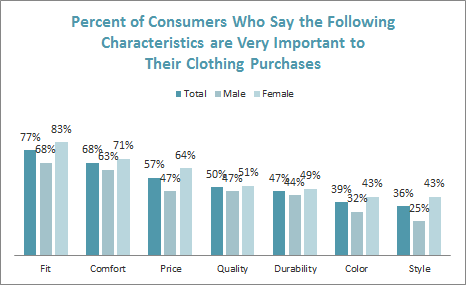Fit remains an essential component for shoppers looking to buy something new. So both online and brick and mortar retailers are looking toward high tech solutions in an effort to aid shoppers in their quest, while helping to move more product themselves and cut down on returns.
[quote]One such service is Me-Ality, an in-store body measurement system developed by Nova Scotia-based Unique Solutions Design, Ltd. It’s a free apparel size-matching technology for customers who shop in-store.
“It scans customers and then matches their body measurements to hundreds of brands and styles in the company’s database,” says Claudia Schou, spokesperson. “It helps shoppers find their best-fitting styles and brands. Consumer feedback is very positive and there are very few returns due to unsatisfied fit. And retailers like it because it saves shoppers time in the dressing rooms — plus, there are fewer returns or clothes to put back.”
More than three-fourths of consumers (78%) say fit is very important to their apparel purchase decisions, followed by comfort (68%), price (58%) and quality (50%), according to the Cotton Incorporated Lifestyle Monitor™ Survey. And when shopping online, 73% of women and 65% of men say sizing is among the top pieces of information they look for before they buy.
A Baymard Institute study showed concern with proper fit is one of the primary reasons consumers abandon their online shopping carts. Shoppers apparently are fine with picking items and going through the checkout process — but they get jittery about whether something will fit when it’s time to enter their credit information.
Further, according to a study by Kurt Salmon, up to a third of all online apparel purchases are returned, with most of the problems being due to fit. Some shoppers order multiple pairs of the same item, with the intent of returning those they don’t want. Others just return an item and, feeling discouraged, don’t re-order another size. At the end of the day, this plus free shipping can greatly affect a retailer’s bottom line.
The Monitor survey finds 72% of consumers are “very or somewhat concerned” about not being able to try on apparel when shopping for clothes online.
Mipso, an international company that offers virtual fitting rooms for brands and retailers, aims to ease that worry. It offers shoppers size recommendations online, on their smartphones and in-store.
“The setup for shoppers is very simple,” says Anjel Sadiky, spokesperson, adding that it counts the U.S. Polo Assn. as a client. “With the entry of only two measurements into the system — height and waist — their size is determined. They can then shop online or on the go. Then they can also scan the existing bar code of any item in-store and get personalized size recommendations, a virtually dressed avatar wearing the garment, available inventory, and the potential for promotions, outfit suggestions and wish lists.”
Sadiky says Mipso’s technology increased vendor basket sizes by 52% and decreased returns from 46% to 16%.
“Returns are the most frustrating thing for retailers. As a matter fact, this is the main barrier preventing retailers from expanding their online business,” Sadiky says.
A.T. Kearney reports the U.S. has one of the world’s largest online retail markets, at $177 billion, and it is expected to double by 2017. If the fit quandary could be solved, it could well result in more purchases and fewer returns. The National Retail Federation ranks women’s apparel as the best-selling Internet item, followed by books, computer hardware, computer software and general apparel.
Currently, just 7% of consumers buy most of their apparel online, according to the Monitor. This is despite the fact that 73% of consumers have browsed online for apparel, and say they spend more time shopping online each month (108 minutes) than in store (97 minutes).
In traditional shops, retailers like Arden Reed in New York are using 3D body scanners to get true customer measurements. Its technology can capture 1.5 million points of detail on a person within a few minutes.
At Acustom Apparel in New York’s SoHo district, men’s wear shoppers can get everything from bespoke suits to Cone Denim jeans to formal wear quickly and individually tailored thanks to an in-house, 3D body scanner.
Another company, London-based 3D-A-Porter, sets customers up with scanning providers. After the scanner is complete, 3D-A-Porter issues an ID that shoppers can use to see how apparel from different brands will look, whether they want to buy it online or pre-shop before heading to a store.
The Me-Ality scanning booths can currently be found in Bloomingdale’s locations in New York, Washington, D.C. and Santa Monica, CA. Schou says with high accuracy, the Me-Ality scanner can match a diversity of body types with a wide variety of apparel brands and styles, presenting a viable solution for what can be a perplexing shopping process.

